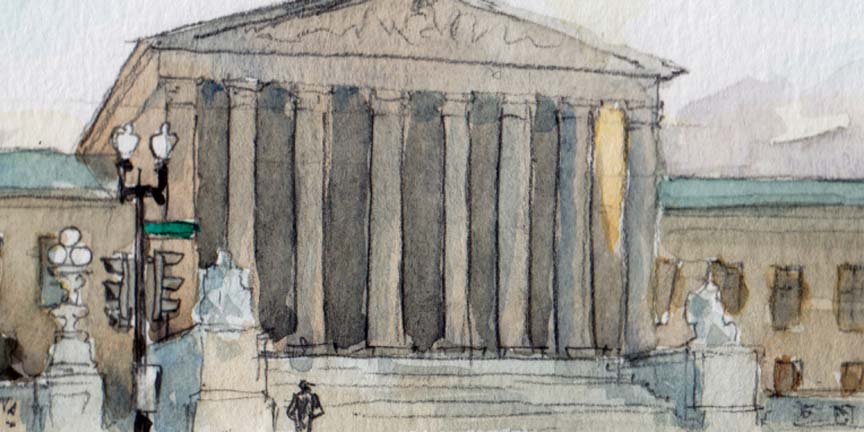Thursday round-up

on Nov 1, 2018 at 7:24 am

Yesterday the justices heard oral argument in Frank v. Gaos, in which the court has been asked to make it harder for companies to settle class-action lawsuits without providing direct compensation to class members, through a process known as “cy pres.” Richard Wolf reports for USA Today that the court “appeared divided along ideological lines,” with “[t]he more conservative justices … hostile to plaintiffs and defendants devising their own settlements and leaving potential beneficiaries penniless,” and “liberal justices … more sympathetic to lower court judges who recognize the difficulties in spreading money around huge classes and instead seek out nonprofits.” For The New York Times, Adam Liptak reports that “[m]uch of the argument concerned whether paying the plaintiffs was practicable.” Additional coverage comes from Greg Stohr at Bloomberg and Robert Barnes for The Washington Post, who reports that “[w]ith all the debate about the issue, several justices seemed to have problems with the case that might keep them from addressing the merits.”
Amy Howe has this blog’s analysis, which first appeared at Howe on the Court, of the argument in yesterday’s second case, Jam v. International Finance Corporation, in which the court will decide whether international organizations have the same immunity as foreign governments have under the Foreign Sovereign Immunities Act, which contains an exception for commercial activities. At Law360 (subscription required), Jimmy Hoover reports that the justices grappled with whether the 73-year-old statute granting immunity to the organizations “provides the same immunity ‘as is enjoyed’ by foreign states today, or at the time when the statute was passed.”
Bethany Berger analyzes Tuesday’s argument in Washington State Department of Licensing v. Cougar Den Inc., which asks whether an 1855 treaty created a right for members of an Indian tribe to avoid taxes on off-reservation commercial activities that involve travel on public highways, for this blog. At Bloomberg Law, Jordan Rubin and Emma Beyer report that “Yakama Nation Tribal Council Chairman JoDe Goudy was barred from [the] argument … because he insisted on wearing the full complement of his traditional tribal regalia, which he said left him feeling ‘very dehumanized.’” This blog’s argument analysis in Tuesday’s second case, Garza v. Idaho, in which the justices considered whether a criminal lawyer can refuse to file an appeal from a guilty plea because of a plea waiver, comes from Evan Lee.
Briefly:
- For Fox News, Shannon Bream and Bill Mears report that “[d]espite the explosive political fight surrounding [Justice Brett Kavanaugh’s] confirmation, the 114th justice has been fitting nicely inside these marbled hallways, where most of the court’s work is done in private.”
- At The Employment Law Group, R. Scott Oswald writes that “the justices heard arguments in two separate cases under the Federal Arbitration Act [on Monday] and seemed likely to deliver a business-friendly outcome in both — even though this will require them to treat the FAA’s blind enforcement of arbitration agreements as sacrosanct in one instance, while undermining it in the other.”
- For Capitol Media Services (via the Arizona Capitol Times), Howard Fischer reports that “[t]he nation’s high court wants the views of the Trump administration on whether a Border Patrol agent can be held liable for shooting and killing a teen through the border fence in Nogales,” Mexico.
- At The WLF Legal Pulse, Richard Samp describes recent developments on remand in Expressions Hair Design v. Schneiderman, a First Amendment challenge to a New York regulation that regulates credit-card surcharges, indicating “that the Expressions case is likely to make its way back to the Supreme Court within the next several years.”
- For The New York Times, Linda Greenhouse reviews a new biography of Justice Ruth Bader Ginsburg, noting that readers “are left to wonder what it was, beyond obvious dismay at the court’s conservative turn, that transformed a judge known for singing the virtues of minimalism and consensus-building into a famous dissenter.”
- At Empirical SCOTUS, Adam Feldman “looks at the Court’s citations to academic scholarship over the past two terms.”
We rely on our readers to send us links for our round-up. If you have or know of a recent (published in the last two or three days) article, post, podcast, or op-ed relating to the Supreme Court that you’d like us to consider for inclusion in the round-up, please send it to roundup [at] scotusblog.com. Thank you!


